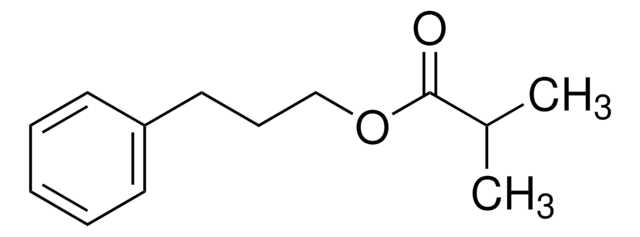W315109
2-Ethyl-1-hexanol
≥99%, FG
Synonym(s):
Isooctyl alcohol
About This Item
Recommended Products
biological source
synthetic
Quality Level
grade
FG
Fragrance grade
Halal
Kosher
Agency
follows IFRA guidelines
meets purity specifications of JECFA
reg. compliance
EU Regulation 1223/2009
EU Regulation 1334/2008 & 178/2002
vapor density
4.49 (vs air)
vapor pressure
0.2 mmHg ( 20 °C)
Assay
≥99%
autoignition temp.
550 °F
expl. lim.
0.88 %, 104 °F
9.7 %, 113 °F
refractive index
n20/D 1.431 (lit.)
bp
183-186 °C (lit.)
mp
−76 °C (lit.)
density
0.833 g/mL at 25 °C (lit.)
application(s)
flavors and fragrances
Documentation
see Safety & Documentation for available documents
food allergen
no known allergens
fragrance allergen
no known allergens
Organoleptic
fresh; oily; citrus; floral; sweet
SMILES string
CCCCC(CC)CO
InChI
1S/C8H18O/c1-3-5-6-8(4-2)7-9/h8-9H,3-7H2,1-2H3
InChI key
YIWUKEYIRIRTPP-UHFFFAOYSA-N
Looking for similar products? Visit Product Comparison Guide
General description
Application
- Thyroid Hormone Transporters in a Human Placental Cell Model.: This study investigates the role of 2-Amino-2-norbornanecarboxylic acid in the transport of thyroid hormones in placental cells, offering insights that could improve understanding of fetal development and maternal health (Chen et al., 2022).
Signal Word
Warning
Hazard Statements
Precautionary Statements
Hazard Classifications
Acute Tox. 4 Inhalation - Eye Irrit. 2 - Skin Irrit. 2 - STOT SE 3
Target Organs
Respiratory system
Storage Class Code
10 - Combustible liquids
WGK
WGK 1
Flash Point(F)
167.0 °F - closed cup
Flash Point(C)
75 °C - closed cup
Personal Protective Equipment
Certificates of Analysis (COA)
Search for Certificates of Analysis (COA) by entering the products Lot/Batch Number. Lot and Batch Numbers can be found on a product’s label following the words ‘Lot’ or ‘Batch’.
Already Own This Product?
Find documentation for the products that you have recently purchased in the Document Library.
Customers Also Viewed
Our team of scientists has experience in all areas of research including Life Science, Material Science, Chemical Synthesis, Chromatography, Analytical and many others.
Contact Technical Service
















